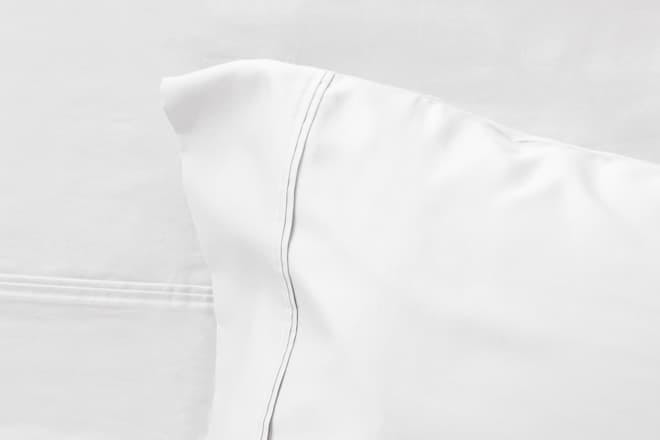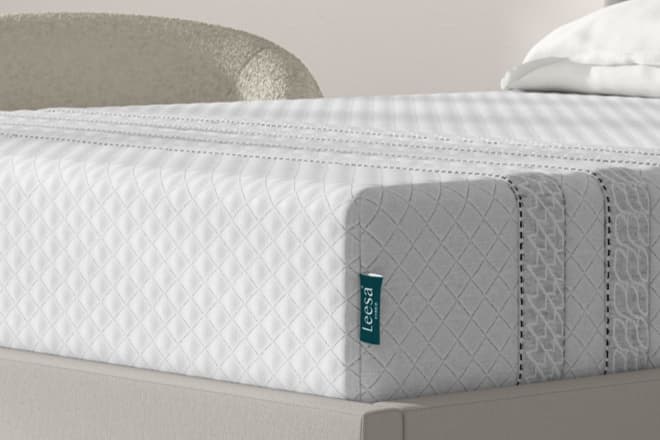Tencel is a type of fabric made from raw wood materials. It was developed by an Austrian company in 1972 and has since become widely popular for its sustainability, antibacterial properties, and comfortable texture.
Manufacturers often combine Tencel with other textiles, especially cotton or silk to create sportswear, mattresses, and bedding. Tencel mattress protectors and sheets are especially popular, along with the Tencel mattress.
Besides having a soft texture, Tencel helps regulate temperature and wick moisture away from the skin. If you’re a hot sleeper or live in a warm climate, Tencel bedding might be just what you need.
What Is Tencel?
There are two types of Tencel: Tencel Lyocell fibers and Tencel Modal fibers. Both types of fibers are produced from sustainably sourced wood cellulose. Wood cellulose is the primary strengthening material in wood. Manufacturers use a chemical process to dissolve the wood pulp, extract the cellulose, spin it into fibers, and then weave it into yarn.
Tencel Modal fibers create an incredibly comfortable fabric that is whisper-soft and stretchy. For these reasons, manufacturers frequently use Modal for making sportswear and undergarments.
Tencel Lyocell fibers are used in a variety of fabrics and offer strength, extreme comfort to the skin, and effective moisture absorption. Because of their versatility, Lyocell fibers are often combined with other fibers like silk, polyester, cotton, or wool, and are often used in bedding.
How Is Tencel Made?
To make Tencel, manufacturers combine ground wood pulp with a chemical solvent and put it through a process called spinning. Spinning allows the wood polymer to be extruded through thin holes in an instrument called a spinneret. Once the fiber leaves the spinneret, it starts to dry and solidify. After drying, the fiber is then made into thread, which is woven into a fabric.
Sustainably Managed
The entire production of Tencel is more environmentally friendly than that of making most other fabrics.
Both types of Tencel are defined as regenerated fibers. Tencel Lyocell is made from sustainable eucalyptus wood, whereas Tencel Modal is made from beechwood pulp. Eucalyptus trees grow fast — in some cases up to 100 feet in just a decade — and require less water than many other trees. This makes Tencel's woven fibers more environmentally friendly than many other fabrics.
The solvent used in making Tencel is amine oxide (MMNO), which is heated and the wood pulp dissolves in it. The resulting product is then put into a bath which removes the amine oxide. Most of the solvent is reclaimed and reused. This technique is called a closed-loop method in manufacturing and is part of a sustainable business model. Because the solvent is recaptured, the amount of emissions into the atmosphere is significantly lowered.
How Is Tencel Used?
Tencel is popularly used in clothing, furniture upholstery, bedding, and other products. Its natural sateen weave creates an attractive texture, appearance, and skin feel. And because Tencel fibers are produced from sustainable sources, their uses are growing in popularity.
Tencel Bed Sheets
Tencel's natural antibacterial properties stem from its ability to wick moisture away. This is another benefit of Tencel, in addition to its sustainability and silk-like feel.
You can often find Tencel sheets blended with bamboo or linen. Tencel is durable, easily washable, and besides being soft, is incredibly strong. Tencel sheets have deep corner pockets to lessen any potential slippage from your mattress.

Tencel Mattress Protectors
Why is Tencel an ideal fabric to use in mattress covers? Because Tencel's qualities have everything you'd want to protect your investment. Since Tencel repels moisture, it's nearly waterproof. And that means it also protects from bacteria. A mattress protector is a hygienic way to protect your health and your mattress.

What Are the Benefits of Tencel?
If you've made it this far, you can undoubtedly see that Tencel has several benefits and that using a Tencel mattress protector can enhance the quality of your sleep. Let's see why.
Breathable
Ever wake up covered in sweat? It happens. Some people are hot sleepers. Or you may live in a warm climate and have issues with heat retention. What you want is a mattress cover that will help you stay cool, not heat you. Tencel's breathability ticks all the boxes.
Durable
Because Tencel is made from wood pulp, it's a very durable fabric. But even though Tencel is more durable than cotton, which tends to shrink, is thick, and traps heat, it’s still silky and soft to the touch.
Appearance
When used for bedding, Tencel is most often woven in a luxurious sateen weave, which gives the fabric a pleasing and elegant sheen and softness that's comparable to silk. Unlike silk, however, Tencel doesn't wrinkle. What more could you ask for — bedding that's not only attractive but also trouble-free?
Hypoallergenic
Tencel is completely hypoallergenic, which makes it outstanding for people with sensitive skin or respiratory issues like asthma. And because Tencel is less susceptible to bacteria and resulting odors, it's an ideal fabric for bedding. A Tencel mattress protector will also repel dust mites, another frequent cause of allergies.
Alternatives to Tencel
As great a sustainable bedding option as Tencel is, there are other sustainable options to consider. Leesa's organic 400-count cotton sheet set is one such option. Also in a sateen weave, our sheets are unbelievably soft. Coupled with our Tencel mattress protector, you'll get the best of both worlds: luxury, durability, moisture wicking, and allergy repelling.
Bamboo sheets are another popular Tencel alternative. They're just as soft as Tencel and mimic Tencel's moisture-wicking and antimicrobial benefits. Bamboo's downsides include a higher price and a tendency to wrinkle.
FAQs
Is Tencel good for hot weather?
Tencel bedding is ideal for hot weather. Tencel is moisture-wicking, breathable, and helps you stay comfortably cool. Whether you're a hot sleeper or live in a place where summers get really hot, you'll benefit from a Tencel mattress protector.
Does Tencel shrink when washed?
The first time a Tencel product is washed, it may shrink up to 3 percent — whereas 100 percent cotton shrinks 5 percent every time it's washed.
How long do Tencel sheets/mattress protectors last?
Tencel sheets and mattress protectors have excellent durability. So long as you follow the manufacturer's washing instructions, you can expect Tencel bedding to last up to six years, sometimes longer.
How does Tencel compare to bamboo sheets?
Both Tencel Lyocell sheets and bamboo sheets are similar in the way they are made. Pulp from wood or bamboo stalks is processed, and then the resulting fiber is spun into thread and then woven into fabric. Both types of sheets are soft, durable, have antimicrobial properties, and are allergy-free. However, bamboo sheets tend to be much more expensive than Tencel sheets.
Does Tencel make a good mattress topper?
Tencel makes a great mattress topper. Adding a Tencel mattress topper to your sleep sanctuary will give you an extra comfortable, cool, and deep night’s sleep.
Which mattress topper material is considered the softest?
For softness and durability, Tencel is the best mattress topper material.
Is it worth having a mattress protector?
Absolutely. You spend one-third of your lifetime in bed, and you want to protect your comfy mattress. If you have pets or children, a mattress protector is a must — an accident can easily occur. You don't want those stains or their odors soaking into your mattress.
Is Tencel a memory foam?
No, Tencel is not a type of memory foam. Tencel is a fabric derived from wood pulp.
Can you wash a Tencel mattress protector?
Yes, but be sure to follow the manufacturer's instructions to avoid harming your new Tencel mattress protector.



